'There was no guide': Randy Avent reflects on 10 years of leading Florida Poly in Lakeland
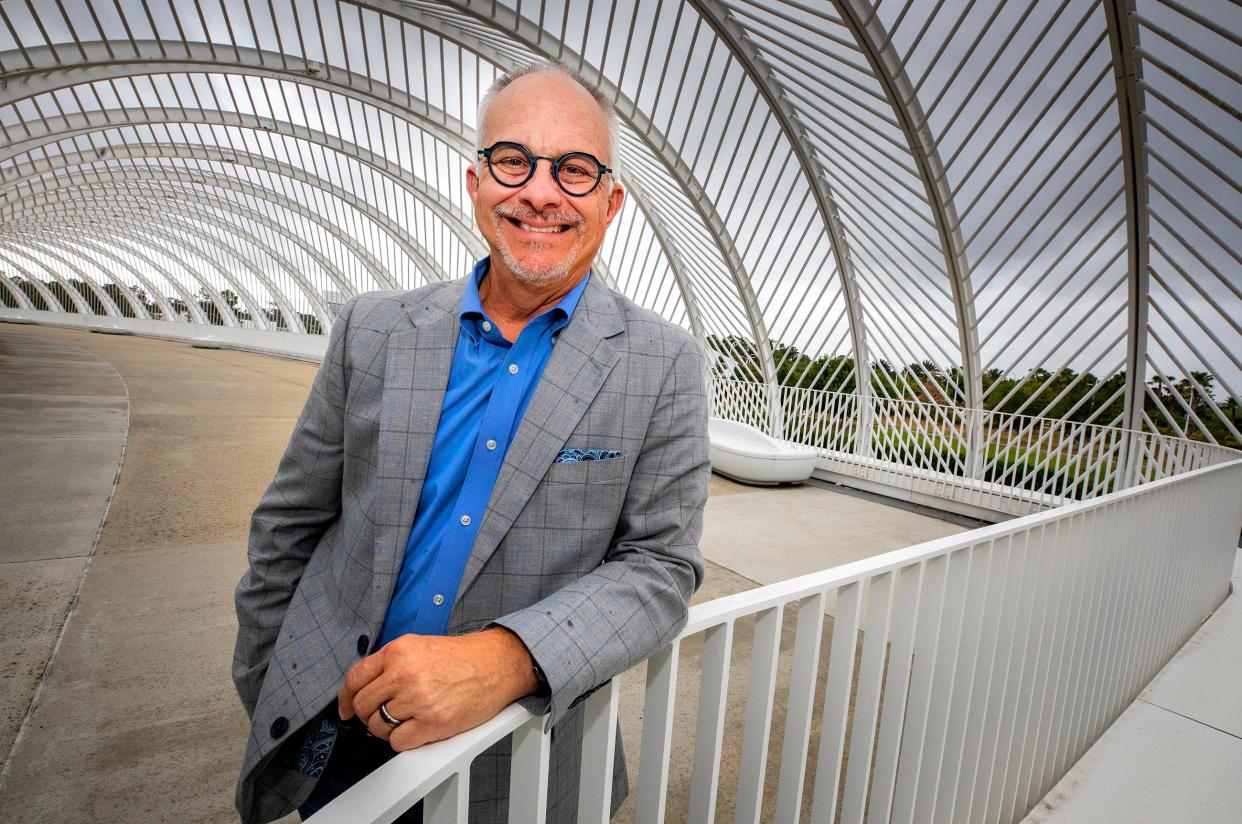
LAKELAND — As Randy K. Avent packed up items from the office he has occupied for nearly a decade, one piece of memorabilia still sat on a cabinet along a tall row of windows: a small, plastic bottle of Jack Daniels whiskey.
The label had been covered with white paper bearing the message: “For those days when iced tea just isn’t enough …”
Avent, who will retire July 6 after a decade as president of Florida Polytechnic University, is known as a devotee of iced tea. The bottle, a gag gift from a staff member, recognized the pressures associated with presiding over a state university from its first semester of classes.
Though Avent received the present eight years ago, the black plastic seal on the bottle remained unbroken. Avent admitted to enduring some harrowing moments while cultivating Florida’s youngest state university, but he never grew frazzled enough to hit the bottle.
How does the current version of Florida Poly compare to what he thought it would be after 10 years?
“I had no expectation,” said Avent, 65. “I mean, there's not too many people that's done this. And so, there was no guide or anything else. And I think that we have a lot to be really proud of here. It has been an uphill battle many times.”
Avent, whose mild twang signals his Carolina origins, spent 24 years on the faculty of the Massachusetts Institute of Technology, the nation’s preeminent engineering school, and then two years as an administrator at North Carolina State before emerging from a national search to become the inaugural president of Florida Poly in 2014.
Lakeland had long hosted classes of the University of South Florida, and leaders of the Tampa school decided to build a standalone campus to the east. Conceived as USF Poly, the school veered toward independence through the political maneuvering of Florida Senate President J.D. Alexander, a Republican from Lake Wales.
Alexander, deploying his power and influence, passed legislation creating Florida Poly as an autonomous university, the state’s 12th, and one specializing in STEM (science, technology, engineering and mathematics) programs. Avent arrived after that dramatic formation, which left USF leaders angry and many others displeased. (The campus is now named for Alexander.)
“I told someone, I think maybe even at a board meeting, that, really, when I came here, a lot of people within the system kind of thought it was a joke and that it really didn't belong and they didn't need it,” Avent said.
He added: “And I think we've taken that joke, and now we're nationally ranked in a lot of different polls. We have the second highest SAT scores in the state. Our students are getting higher starting salaries than any other of the universities. So, we're doing well on a lot of fronts.”
Facing early pressures
Sitting in his spacious office on the second floor of the university’s signature structure, the Innovation, Science and Technology Building, Avent reflected with general contentment on his decade at the school. Hired only three months before classes began in August 2014, Avent came to Lakeland as his wife, Terri, remained in Raleigh, North Carolina, with their youngest son, then a senior in high school.
Florida Poly began with 554 students. Avent said the board of trustees directed him to build toward a student population of 5,000, but no one provided a blueprint. Preoccupied with running the nascent school during the week, he spent his weekends developing a model for expanding the university.
Seeking to reach 5,000 students in a decade, Avent did the calculations and determined that he couldn’t possibly secure the state funding and build the needed student housing in time to meet that goal. He went to the chair of State University System’s Board of Governors, Mori Hosseini, recommending the “slow” model of 5,000 students in 20 years.
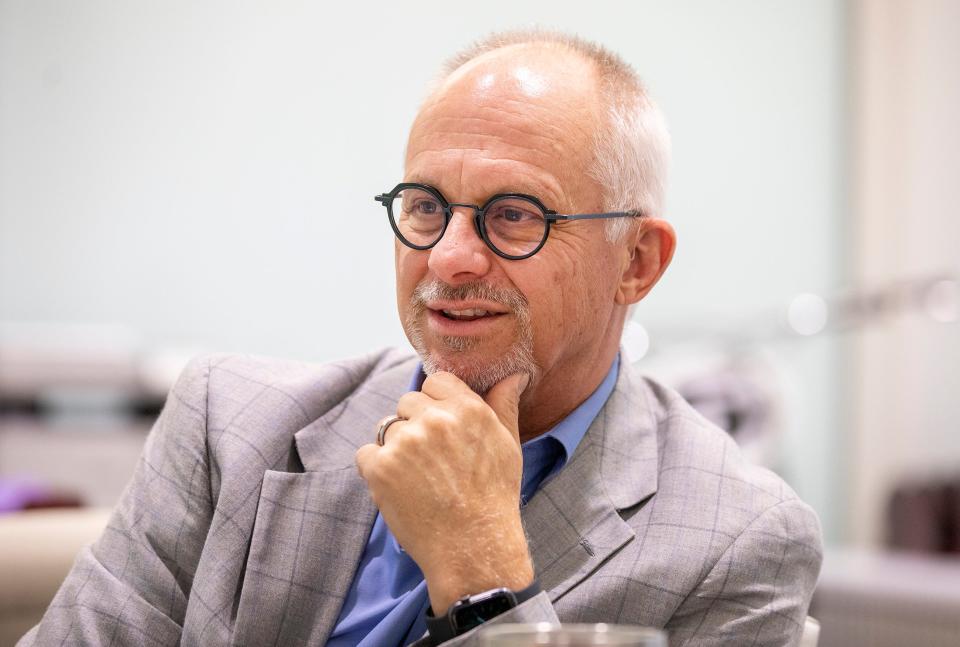
“And he looked at me and he says, ‘Randy, I've been looking for someone to tell me how this university is going to flow in,’” Avent recalled. “And he says, ‘You will have no more problems from me.’”
Even the 20-year model was “extraordinarily aggressive,” Avent said. After a decade, the university has about 1,600 students, including those in graduate programs. The school is now building a third student dormitory in the expectation of rapid future growth.
Avent describes Florida Poly’s first years as something of a frenetic scramble. The school faced a legislative mandate to reach 1,300 students in 2½ years.
“We grew extraordinarily fast, and we hired faculty like crazy — anybody who showed up at the door, really,” he said. “And we had no clue. I mean, how many history teachers do you need? How many English teachers do you need? … So, it was kind of a random, shotgun approach, really.”
'Sinking or swimming': Polk County cultural groups feel the pain of DeSantis' veto
It was also a challenge to lure professors to a startup university.
“The other thing is, remember, there was a big cloud of controversy over the university when it started,” he said. “It was not getting a lot of good press, to say the least. So, what strong faculty member wants to come, if all they're reading is this negative stuff about the university and everything else.”
In the early years, university leaders would regularly find themselves short of instructors at the start of each semester.
“I remember because I got a little bit of PTSD, is up until the point where Terry Parker came as the provost (in 2016), at the beginning of every semester, we would have 10 classes that had no teacher,” Avent said.
The quality of instruction has steadily improved, Avent said, and some of Florida Poly’s engineering faculty are internationally known subject experts.
Racing for accreditation
The Legislature mandated that Florida Poly achieve accreditation within 2½ years. Leaders of the Southern Association of Colleges and Schools Commission on Colleges initially approved the university’s schedule, Avent said, but then some of its leaders determined that its rules forbade accreditation in less than three years.
He had to appear before the state’s Board of Governors and explain that Florida Poly would not meet the deadline, in the process getting “grilled a lot” at the meeting. After Avent returned from the meeting, his then-assistant presented him with the individually labeled Jack Daniels bottle.
In the end, Florida Poly missed its deadline for accreditation by one day, as SACSCOC dated it for Jan. 1, 2017.
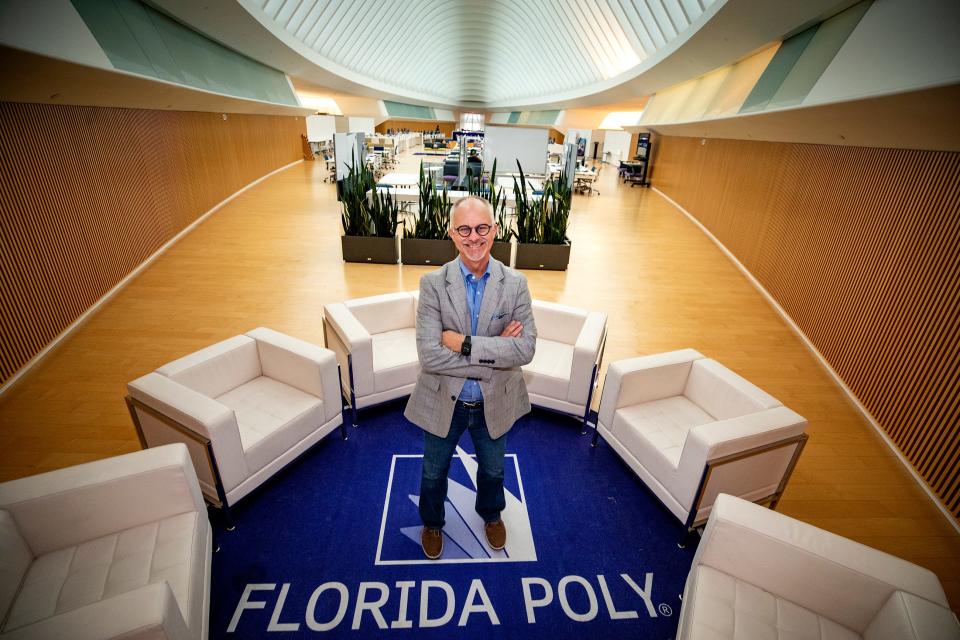
Avent endured another trying period in 2020, when Florida Rep. Randy Fine, R-Palm Bay, introduced a bill in mid-session that would have folded Florida Poly under control of the University of Florida. Avent lobbied legislators against the measure, and the bill stalled. Though Republican leaders suggested that the proposal be considered again the next year, it seems that any support for the idea has faded.
How stressful was that battle?
“Pretty stressful,” Avent said. “I spent a lot of time in Tallahassee during that period, and, yeah, it was a difficult time. But we had a lot of good, strong support from the right people. And so, I’m real thankful for that.”
Having met the student population mandate in the third year, Avent said he and other Poly leaders then concentrated on the quality of the faculty and the incoming enrollees. He recalled the guidance of Terry Parker, now the school’s provost and executive vice president, who came to Florida Poly from Colorado School of Mines, a highly regarded engineering school.
Parker said the Colorado school reached a turning point when the average SAT scores of incoming students began to exceed 1,300. Florida Poly’s incoming freshman class in 2023 carried an average SAT score of 1,323, ranking behind only the University of Florida among state public schools. Avent hopes the average will exceed 1,400 before long.
While state leaders emphasize that Florida Poly must continue to expand, Avent noted that two of the nation’s elite engineering schools — MIT and Cal Tech — each has fewer than 5,000 undergraduate students.
“You don't have to be big to have a big impact, but, by God, I'll tell you what, if you're going to be small, you better have really good students,” Avent said. “And you better have really good faculty. Because otherwise, you're not going to have much of an impact.”
Analyzing Poly's numbers
Some critics of Florida Poly point to its apparently low graduation rates. U.S. News & World Report has listed the school’s four-year graduation rate at 31% and its six-year rate at 47%, last among state schools in both categories. Avent said those statistics are outdated, listing the current figures at 41.2% and 53%.
Avent suggested that it's misleading to compare rates for a STEM-oriented school to those for institutions offering a wide range of programs. He said students who begin as intended engineering majors at larger schools often change majors after encountering a calculus class, perhaps to business, but that is not an option at Florida Poly.
Engineering schools lose many students after their freshman years, but Florida Poly is focused on improving student retention, which he said is now at 75% — compared with an average of 85% for more established peers.
Florida Poly’s 2023 accountability plan, approved by the Board of Governors, lists four areas of attention under the heading “Graduation Improvement Plan Update": excellence and improvement in the freshman year; student culture, supporting the whole student; enhanced degree-plan advising and tracking; and tailored support and services for Pell (Grant) students.
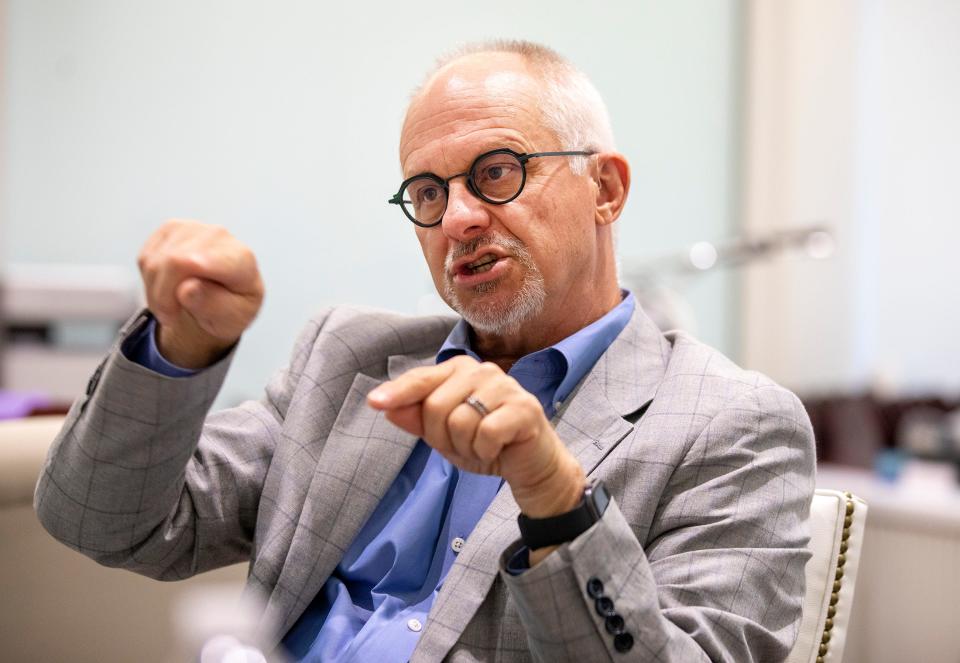
University sources suggest that the turnover rate among faculty has been high. Of the current approximately 75 full-time faculty, only 19 worked at Florida Poly before 2018. And only five of the original 22 professors remain on staff.
Florida Poly does not offer tenure for professors, and many universities do, Florida’s largest state schools. Instead, the university offers three-year appointments for instructors, after which a committee decides whether an assistant professor gets another three-year term.
At the six-year mark, instructors face another assessment that yields an “up or out” promotion. Avent recalled that about half of the instructors in the most recent group of assessments received promotions. While no national rates of tenure approval seem to exist, anecdotal descriptions suggest it is above 80%.
Avent cited another reason for higher turnover among the Florida Poly faculty.
“The other thing is that a lot of faculty use this as a stepping stone,” he said. “This is almost like a postdoc to many faculty. You come in, and then you use this as a stepping stone, and so we have a faculty member that leaves and goes to a bigger position at another university.”
Avent and Florida Poly’s leadership have sometimes clashed with a faculty union that formed in 2016. The union filed an unfair labor practice claim after the school fired three of the four faculty members on its bargaining team,
Artificial intelligence: Polk County Sheriff's Office creates new lab with Florida Poly
Florida Poly in 2020 settled a federal lawsuit filed by a professor who had been told her contract would not be renewed. The school agreed to pay Christina Drake $250,000 in exchange for her resignation. Also in 2020, a state commission ruled that Florida Poly wrongly disciplined an assistant professor, Melissa Morris, and ordered the discipline rescinded.
Union leaders have said that faculty surveys indicated low morale and complaints about a perceived lack of job stability.
Seeking to lure industry
Since his hiring, Avent has advocated for the creation of a high-tech industrial zone in the undeveloped areas surrounding the Florida Poly campus. He is familiar with the concept, having come from N.C. State, which supports Research Triangle Park, along with two other universities.
Despite land-use agreements with Polk County, Lakeland and Auburndale, the proposed Central Florida Innovation District has not yet emerged. The Florida Department of Transportation did create a 475-acre testing facility, SunTrax, not far from campus, and Florida Poly signed an agreement in 2022 with International Flavors & Fragrances Inc., a Fortune 500 company, to occupy a nearly 30,000-square-foot research facility on campus scheduled to open early next year.
Avent said that companies look for universities with strong graduate programs in choosing to locate near campuses, and Florida Poly is still developing its graduate programs. He cited another obstacle: The university does not own the land surrounding campus, which is controlled by Williams Acquisitions Holding Company.
“I'm happy to say that we have a wonderful working relationship with the Williams Company, that owns all the property around us,” Avent said. “It’s a wonderful company that's very innovative, that understands the vision, so we continue discussions with them, and I'm hopeful there.”
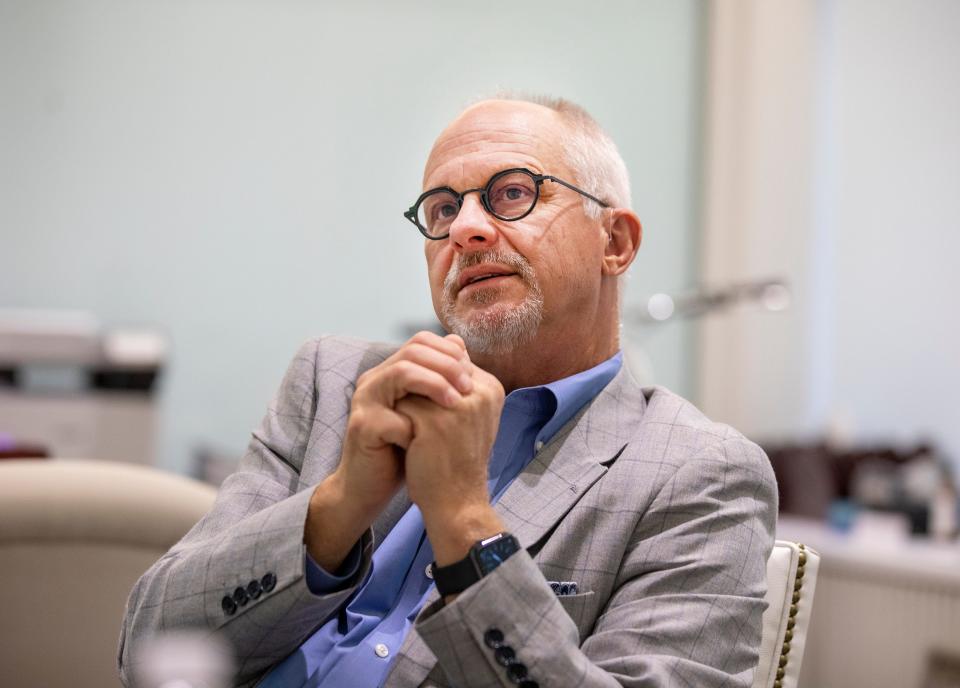
Asked about his chief accomplishments at Florida Poly, Avent talked about creating the right culture and bringing the right people to the institution.
“I learned many years ago, when I was at MIT’s Lincoln Laboratory, that if you get the right people and put them in the right place, give them what they need and then get out of their way, you could do really big things,” he said. “We started from scratch — I mean, literally from scratch, with one employee, Ava Parker. And in a little over 10 years’ time, we were able to turn it into the number one public college in the South.”
U.S. News & World Report has ranked Florida Poly first among public colleges in the Southeast and in the top 20 nationally for public engineering programs without doctorates.
Avent is scheduled to depart in August for Spain, where he will spend four months at the University of Barcelona on a Fulbright-Schuman Innovation Award. That award is presented annually to one American scholar to support research on policy and technology.
Florida Poly previously announced that Avent would return to the school as a professor after a one-year sabbatical. Avent said he will consult with his successor, G. Devin Stephenson, on how long he might remain at the school.
When Avent does fully retire, he said he will have plenty of hobbies to pursue, among them wood-working, iron-working and restoring old motorcycles. Two of Avent’s dirt bikes were on display in his office: a 1971 Penton 125 Six Days with green and yellow trim and a 1973 Husqvarna 450WR with red and silver trim. Avent began riding off-road motorcycles in his youth, and he credits Florida Poly students with luring him back into riding and racing with the Florida Trail Riders.
Though he enjoys speed on his bikes, Avent said he looks forward to having a slower mental metabolism as he departs his role at Florida Poly.
“I was telling someone earlier in the day that being a president, I think I’ve become ADD, because there's just so much that comes at you so fast, that it's hard to really focus and concentrate on anything,” he said. “I've gotten to the point where it’s hard for me to read a book because I can't sit still.”
Gary White can be reached at gary.white@theledger.com or 863-802-7518. Follow on X @garywhite13.
This article originally appeared on The Ledger: Randy Avent reflects on 10 years of leading Florida Poly in Lakeland

